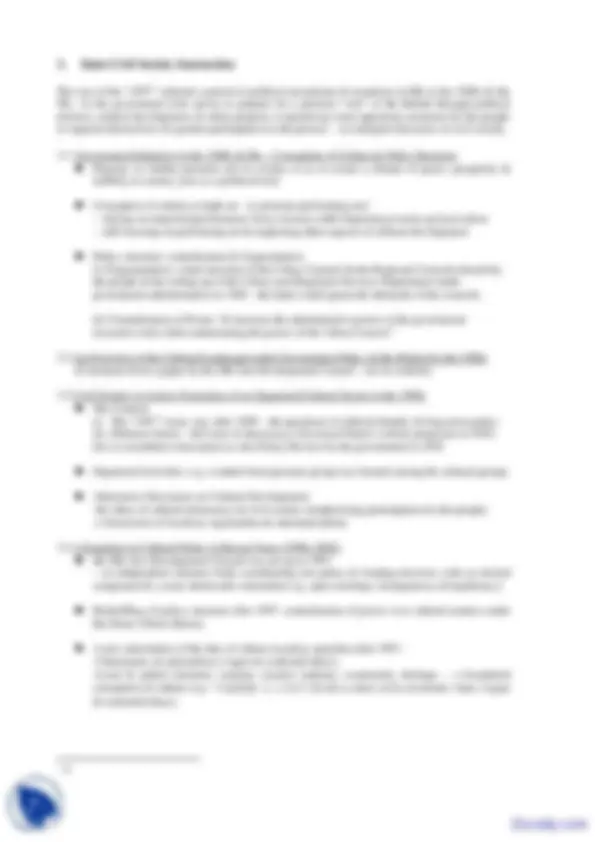



Study with the several resources on Docsity

Earn points by helping other students or get them with a premium plan


Prepare for your exams
Study with the several resources on Docsity

Earn points to download
Earn points by helping other students or get them with a premium plan
Community
Ask the community for help and clear up your study doubts
Discover the best universities in your country according to Docsity users
Free resources
Download our free guides on studying techniques, anxiety management strategies, and thesis advice from Docsity tutors
It is the Lecture Notes of Hong Kong Culture which includes Theoretical Position, Rethinking Colonialism Nationalism, Themselves As Sojourners, Immigration Policy Making, Republic of China, Systematic Ideological Discourse etc. Key important points are: Hong Kong Identity, Popular Culture, Prominent Role, Official Discourse Complement, Campaigns, Participation, Cultural Development, Colonial Rule, Systematic Ideological Discourse, Centralization
Typology: Study notes
1 / 3

This page cannot be seen from the preview
Don't miss anything!


L3: HK Identity
It’s often claimed that popular culture plays a prominent role in shaping HK culture. Why & How? Some scholars also highlight the role of the state (government). What are the relative roles played by the two? And do popular culture & official discourse complement, compete with, or mutually constitute each other in the process? Outside the government & the market, a civil society of organized collective action (e.g. campaigns & participation) by the people remained almost non-existent in the cultural sector until the cultural groups organized themselves to push for a long-term cultural policy in the 1990s, which began to change the landscape of cultural development in new directions.
1.1 Absence of Systematic Ideological Discourse by the Government In many societies, the modern state will continually engineer a project of national unification & rejuvenation by means of cultural centralization through language, education, art, & public symbols (e.g. flag) & rituals (e.g. celebrations held on the national day). Nationalism, for example, is often evoked to consolidate the people’s sense of common belonging to the state and the nation.
In HK, the government did not initiate such a process whereby a distinctive HK identity or culture was promoted. It was concerned about developing political ties with the elite in society rather than establishing legitimacy among the general people. And it was concerned about maintaining social order rather than cultivating a sense of cultural identity among the people. [Why?]
Result: absence of systemic ideological discourse in society, leaving an ideological vacuum for popular culture to fill in:
1.2 The Role of Popular Culture in the Formation of Common Culture/Identity -shared experience & common repertoire of symbols and representations etc. (Please refer to Ng’s article for further details)
1.3 Ideological Elements Found in Popular Culture (1950s-70s) an insecurity consciousness (main concern: mere survival) a traditional sense of self-help among close kin & neighbors (e.g. “人人為我,我為人人”) a sense of distrust in the authority (e.g. outbursts of discontent in the riots in mid 1960s)
(a) These remained as fragmented ideological elements in popular consciousness rather than develop into any systematic ideological discourses.
(b) After the 1970s of economic growth, the old elements remained except that insecurity consciousness was turned into a sense of economic optimism (“stability & prosperity”).
(c) In the 1990s, due to the “1997” issue, a few systematic ideological discourses emerged to compete over the construction of HK identity (e.g. nationalism, democracy & capitalism).
2.1 Hybridity For Turner, the 1960s represents the coming of age of the “HK people” (vs. “Chinese people). He finds in HK culture a distinctive element of hybridity (混雜) rather than some stable & all-embracing discourses - a clash of discourses between citizen & compatriot, Chinese & Western, morality & utilitarianism, official rhetoric & lived experience, and the local & the international etc. “It was precisely the inability to articulate identity during the sixties along any stable narrative that marked out Hong Kong people from Chinese on the Mainland or Taiwan” (p.20).
Turner shares with Ng’s observation that popular culture plays an important part in HK culture, but he also finds a more conscious ideological role played by the government after the riots in the mid 60s. This, however, did not necessarily mean the nurturing of systematic discourse.
Rather the community-building project was “heavily circumscribed.” The colonial government in the 60s & the Chinese government in the 90s avoided the expressions of an independent cultural identity - an identity constituted against, respectively, colonialism or the Mainland authority – by sticking to some vague conventional metaphors such as “meeting of East & West”.
2.2 The Government’s New Orientation in the 1960s – The Political & Economic Context
2.3 Competition between Elite (Official) and Popular Discourses (a) Official Discourse (through textbooks, trade promotions, public information campaigns & tourist publicity): “an harmonious blend of East and West,” & a society becoming progressive & modern;
(b) Popular Discourse: “they were able to portray social conflict repressed in Government publications. Local culture also exceeded the approved line of ‘East meets West.’” (e.g. 小流氓)
2.4 Elite Discourse Becoming Dominant/ Hegemonic -Official representations were “absorbed into the self-perception & daily lives of HK people.”
E.g. In the annual Chinese Manufacturers’ Exhibition of HK Products, the largest festival outside Chinese New Year, the local goods became the icon of HK identity.
In the 1970s, the government pursued a policy of “community-building” – e.g. “Fight Crime” & “Clean Hong Kong” campaigns (slogan: “Hong Kong is our home”). By the 1980s, surveys showed more & more people identifying themselves as “HK people” in preference to “Chinese.”
2.5 HK Life Style (as a Site of Resistance) -a flexible, ambiguous local cultural identity (pp.20-21): “In this hybrid between over-determined, paternalistic rhetoric and the indeterminancy of popular experience, the population of Hong Kong came to identify themselves as ‘Heung Gong Yan’” (p.22)
-For life style to be a site of resistance for local identity, it is better it remains “unarticulated, yet at the heart of the Joint Declaration, for life-style can be expressed, but it cannot easily be censored.”